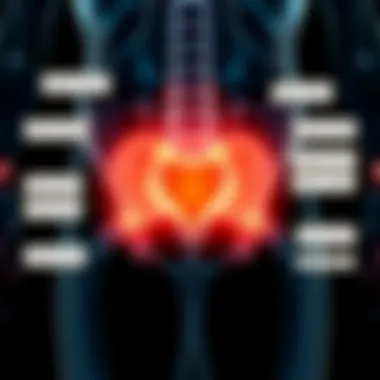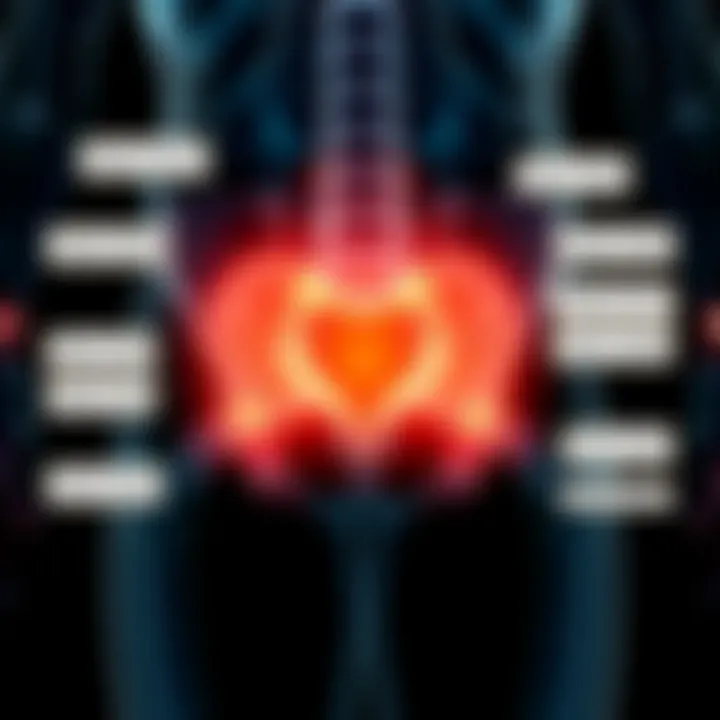Understanding the Constant Urge to Urinate


Intro
The urge to urinate is something that most people experience from time to time. For some, however, this sensation can become a constant companion, leading to discomfort and lifestyle disruptions. Understanding the mechanisms that drive this urge is crucial not just for individual well-being, but for navigating the complex interplay between lifestyle habits and our health. This exploration opens up an essential conversation addressing various factors behind frequent urination, including dietary choices, physical health, and mental state.
While it might seem trivial, the nuances of this topic are significant. Many might shrug it off as a mere nuisance, but the experience of frequent urination can indicate underlying health issues that warrant a closer look. In this space, we aim to shine some light on these concerns, providing insights that are grounded in current research and health practices.
As we venture further, we will shed light on the impact frequent urination can have on one’s daily life. The combination of physiological responses and personal wellness choices is paramount. By engaging with this topic, we hope not only to inform but also to empower our readers, creating awareness that can lead to proactive health management and improved quality of life.
Let’s dive into the health benefits tied to understanding this bodily signal.
The Normal Mechanics of Urination
The process of urination, while often taken for granted, is a complex interplay of physiological mechanisms that are essential to our health. Understanding this delicate system can offer insights into why we experience the need to urinate frequently. The mechanics involve various components, such as the kidneys, bladder, ureters, and sphincters, each playing a critical role in managing the storage and expulsion of urine. This section adequately sets the stage for our discussion on the nuances of urinary frequency and what constitutes normal urination.
Understanding Urinary Frequency
Urinary frequency refers to how often an individual feels the need to void their bladder. Under normal circumstances, most people urinate about six to eight times a day. However, various factors can influence this frequency, making it vary from one individual to another. These factors can range from dietary habits to stress levels, which are particularly important in the context of frequent urination.
When discussing urinary frequency, it’s crucial to note that hydration plays a significant role. For instance, drinking more water leads to increased urine production. Similarly, consuming diuretics such as caffeine or alcohol can spur a need to urinate more often. As many health professionals suggest, staying attuned to one’s habits can assist in understanding shifts in urinary patterns, thus aiding in early recognition of potential issues.
What Constitutes Normal Urination
Normal urination is not merely defined by frequency; it encompasses various factors, including volume, color, and urgency. Typically, urine should be light yellow or straw-colored, indicating good hydration levels. Darker urine may signal dehydration, prompting individuals to adjust their fluid intake accordingly. In terms of volume, the average urinary output is roughly 800 to 2,000 milliliters per day, based on fluid intake and body temperature.
Urgency is another significant aspect of normal urination. While a sudden, strong urge to urinate can be uncomfortable, it should not lead to incontinence or panic. If an individual experiences frequent and urgent needs to urinate that disrupt daily activities, it might be time to evaluate lifestyle habits or consult a healthcare professional.
Frequent urination may signal a variety of conditions, but understanding what is considered normal can empower individuals to take charge of their health and seek help when needed.
The interplay of hydration levels, the influence of food and drink, and individual health factors contribute significantly to what is regarded as normal urination. In subsequent sections of this article, we will delve deeper into how lifestyle choices and underlying medical conditions can alter these norms, providing readers with a well-rounded view of this seemingly simple bodily function.
Behavior and Lifestyle Factors
Understanding the role that behavior and lifestyle factors play in the urge to urinate can significantly affect how one approaches this common issue. Many individuals may not realize that their daily choices—ranging from what they drink to how they manage stress—can heavily influence urinary frequency. By examining these factors, we will unpack the intricate relationship between lifestyle habits and urinary health, offering valuable insights and actionable strategies.
Influence of Hydration Levels
Hydration is key when discussing urinary patterns. While it might seem straightforward, the amount and type of fluids consumed take on a larger significance. Drinking enough water is essential for overall health, but overhydration or inadequate hydration can produce conflicting effects on the urge to urinate.
When dehydration occurs, your body can create concentrated urine, often making trips to the restroom more uncomfortable. Conversely, drinking excessively—especially right before bed—can lead to frequent nighttime awakenings.
Though water is the best option, other beverages, like juices and herbal teas, also contribute to hydration levels. Remember, body signals often provide clues about whether you're hitting the right balance:
- Light yellow urine generally indicates good hydration.
- Dark yellow or amber urine could suggest the need for more water intake.
"When it comes to hydration, it’s not just about quantity but also quality. Watch out for drinks that might be misleading!"
Impact of Caffeine and Alcohol


Caffeine and alcohol are widely consumed substances that can significantly influence urinary frequency. These compounds act as diuretics, which can increase urination. However, the effects vary from person to person.
Caffeine, found in coffee, tea, and energy drinks, has a reputation for encouraging urination. While moderate consumption may not pose a problem, excessive intake could lead to a constant urge to find a restroom. For some, this may even disrupt daily activities or sleep patterns.
On the other hand, alcohol not only produces the same diuretic effects but can also impair the body’s natural signals, causing drinkers to ignore their body's prompts. Consider the following:
- Limit caffeine intake if you find yourself frequently rushing to the restroom.
- Alternate alcoholic drinks with water to help moderate its effects.
Dietary Choices and Their Effects
The foods we eat can be a sneaky contributor to urinary frequency. Some dietary components can irritate the bladder, making one feel the urge more often.
For instance, spicy foods and acidic fruits, such as oranges and tomatoes, can be notorious for stimulating the bladder. Additionally, artificial sweeteners like aspartame might cause discomfort for some individuals. Adopting a more bladder-friendly diet can lead to a noticeable difference.
Consider incorporating:
- Whole grains and fibrous foods to promote digestive health, which indirectly benefits urinary patterns.
- Probiotic-rich foods, like yogurt, that can help balance gut health and possibly reduce bladder irritation.
Ultimately, a holistic approach that includes mindful dietary choices can yield more manageable urinary habits.
Medical Perspectives
When an individual frequently finds themselves needing to urinate, it can be more than just a minor inconvenience. Understanding the medical perspectives surrounding this condition is pivotal as it opens up a realm of possibilities regarding underlying health issues. By identifying these potential medical concerns, patients can better navigate their symptoms and seek appropriate care. More importantly, this section arms readers with information that could save them time and potentially safeguard their health.
Possible Underlying Conditions
Diabetes Mellitus
One of the prominent conditions linked to frequent urination is Diabetes Mellitus. This chronic metabolic disorder manifests when the body either doesn't produce enough insulin or can't use it effectively, which brings along a host of symptoms. Elevated blood sugar levels can trigger the kidneys to filter out excess glucose through urine, driving up urination frequency.
A key characteristic of diabetes is its pervasive nature. Left unchecked, it can lead to complications affecting various organ systems. For those grappling with this situation, understanding the role of diabetes in urinary habits can be a game changer. Diabetes Mellitus shines as a pivotal focus within this article, given its well-documented association with increased urination, illuminating a path for early detection and management.
The unique feature of diabetes lies in its multifaceted effects on the body. Regular urination might seem just an annoyance, but it’s often an early warning sign. A significant advantage of recognizing this condition is the chance for timely medical intervention which can profoundly improve quality of life.
Bladder Infections
Bladder Infections, or cystitis, are yet another reason why individuals may feel the urge to urinate frequently. Commonly caused by bacteria, these infections lead to inflammation of the bladder wall, resulting in irritation and a pressing need to empty the bladder more often. This condition can affect anyone, but women are notably more prone to urinary tract infections (UTIs) than men.
A telling aspect of bladder infections is their acute onset. Symptoms are usually sudden, encompassing not only frequent urination but also burning sensations and cloudy urine. Recognizing this as part of our exploration is beneficial, as awareness can lead to quicker treatment. Knowing how to distinguish between a normal urge and one driven by an infection is vital in managing symptoms and preventing escalation.
While bladder infections are generally treatable, the unique feature to consider is the potential for recurrent issues. This can turn into a frustrating cycle for many individuals. Understanding this can empower those affected to seek preventive measures, ideally improving their overall urinary health.
Prostate Issues
In men, Prostate Issues—which can range from benign prostatic hyperplasia (BPH) to prostatitis—often present a direct link to frequent urination. As the prostate enlarges, it can compress the urethra, impeding urine flow and leading to increased urgency and frequency. It’s a common tale for older men, yet many remain unaware of how significantly it can impact their lifestyles.
The prostate's unique characteristic lies in its role as a central player in urinary health for men. This makes it essential for our discussion. These issues are significant contributors to urinary frequency, and recognizing their impact can help readers assess whether their symptoms might be more than just a nuisance.
The advantages of understanding prostate issues include the ability to seek specialized advice and treatment early on, which can alleviate uncomfortable symptoms. However, acknowledging these conditions also comes with considerations; often, men may hesitate to discuss these topics, leading to missed opportunities for addressing the problem.


Neurological Disorders
Neurological disorders can also intersect with patterns of frequent urination. Conditions like multiple sclerosis or spinal cord injuries can disrupt the nerve signals responsible for bladder control. This can result in unpredictable urges and diminish an individual's quality of life.
By comprehending these distinctions between physiological dysfunctions and lifestyle impacts, readers can gain a fuller understanding of their symptoms. This knowledge is key in assessing when it’s crucial to seek medical help.
Understanding the medical perspectives surrounding frequent urination brings clarity not only to the symptoms but underlies the broader health implications. By integrating insights on diabetes, bladder infections, and prostate issues, individuals can embark on a more informed relationship with their health, transforming discomfort into actionable insights.
Mental and Emotional Influence
Understanding the mental and emotional aspects of the constant urge to urinate is crucial. It goes beyond mere physical sensations, diving into how our thoughts and feelings can significantly influence our bodily signals. When one experiences frequent urination, it could easily be dismissed as a straightforward physiological issue. However, a more profound look reveals that psychological conditions can be major contributors, affecting not only the urge but also how individuals perceive this situation in their daily lives.
Recognizing these influences can provide insights into managing symptoms effectively. It’s important to note that a healthy balance between psychological well-being and physical health can contribute greatly to how often someone feels the need to go. The interconnectedness of these aspects can offer a more holistic understanding of this often frustrating situation.
Psychological Factors at Play
The connection between the mind and body is a well-noted phenomenon. Psychological factors, such as stress, fear, and anxiety can play a pivotal role in triggering the urge to urinate more frequently. For many individuals, feelings of uneasiness can translate into physical symptoms that include increased bathroom trips.
- Anxiety Disorders: For people dealing with anxiety disorders, the body can adopt a heightened state of alertness, respond to perceived threats, and send urgency signals. Even minor situations that provoke anxiety—like public speaking or attending social gatherings—can manifest in increased frequency of urination.
- Habitual Thoughts: Rumination or obsessively thinking about the urge can exacerbate the sensation. When one fixates on needing to relieve themselves, it paradoxically amplifies the need. A loop forms where the mind triggers the body, and the body reinforces the mind’s focus.
- Cognitive Behavioral Patterns: Those who tend to associate certain environments with anxiety—like fear of finding a restroom—may find themselves developing a pattern of frequent visits to avoid potential discomfort.
It's essential to consider strategies to address these psychological factors for lasting relief.
Stress and Anxiety Correlation
Stress and anxiety are like two peas in a pod when it comes to frequent urination. High stress levels can lead to increased production of hormones, such as cortisol, which may impact how our bladder functions. When one is stressed, the body may enter a fight-or-flight response, and one common side effect is an overactive bladder.
- Emotional Response: Stressful situations can create a sense of urgency that isn't necessarily linked to how full the bladder is. Understanding the trigger points for stress can aid in developing coping mechanisms that may reduce the physical response.
- Relaxation Techniques: Practices like mindfulness, yoga, or deep breathing can help ease the anxieties that lead to frequent urination. These techniques can provide a calming effect on both the mind and the bladder, allowing individuals to feel more in control.
- Journaling: Writing down feelings and experiences can be a useful tool for processing anxiety. This not only serves as an emotional outlet but may help in identifying patterns that lead to increased urges.
Frequent urges to urinate can serve as your body's way of signaling that something needs attention, often rooted deeper than what's perceived.
A comprehensive approach to mental health, alongside maintaining healthy physical habits, can greatly improve one’s experience. Recognizing the role emotions play doesn’t simply facilitate understanding; it sets the stage for meaningful management strategies.
Everyday Management Strategies
Managing the urge to urinate frequently can be challenging, yet it doesn't have to dominate your daily life. Establishing effective everyday management strategies is crucial in reducing discomfort and enhancing your quality of life. These strategies can help you regain control over your bladder and reduce anxiety associated with urgent trips to the restroom. Here, we will explore practical approaches that can make a significant difference in your routine, helping you stay confident and comfortable throughout the day.
Establishing Healthy Hydration Habits
Water is the essence of life, but it's also a delicate balance when you find yourself rushing to the bathroom more often than not. Understanding hydration doesn’t simply mean drinking water; it’s about the timing and quantity of fluid intake. Many people fall into the trap of guzzling large amounts of water at once, often finding themselves needing to relieve themselves within the hour. Instead, sip throughout the day to maintain hydration.
- Aim for consistent intake: Bring a water bottle to your workspace, and take small sips regularly rather than gulping it down.
- Monitor your daily intake: Most health guidelines suggest about 2 liters a day. Adjust this based on your activity level and the climate you’re in.
- Mind your timing: Try to reduce fluid intake in the hours leading up to bedtime. This can prevent pesky night trips to the bathroom, letting you sleep more soundly.
Incorporating Bladder Training Techniques
Bladder training can feel daunting, but it's an essential skill that empowers you to manage urges. The goal is to gradually train your bladder to hold larger amounts of urine and stretch the intervals between bathroom breaks. While it’s not about suffering through discomfort, patience and persistence pay off. Here’s how to proceed:
- Schedule regular bathroom breaks: Start by visiting the restroom at set intervals, say every hour, even if you don't feel the need. Gradually, extend the time between visits as your bladder adjusts.
- Practice pelvic floor exercises: Strengthening your pelvic muscles can significantly increase control. Exercises such as Kegels can help you hold back the urge effectively.
- Learn to resist urges: When you feel the all-too-familiar urge, try to hold off for a few minutes. This will help retrain your bladder to manage the sensation.
Dietary Adjustments for Relief


Your food choices can also influence how often you find yourself running to the restroom. From caffeine to spicy food, certain items can increase urgency or discomfort. Here are some smart adjustments:
- Cut down on irritants: Caffeine, alcohol, and acidic foods like citrus fruits can exacerbate the urge to urinate. Consider replacing your morning coffee with herbal tea.
- Incorporate bladder-friendly foods: Foods rich in magnesium, like bananas and avocado, or high in complex carbohydrates, such as oats and quinoa, can help create a calmer bladder environment.
- Stay mindful of sugar: High sugar consumption, especially from sodas or sweets, can lead to increased urination. Opt for whole fruits and limit added sugars in your meals.
Avoiding Irritants
Certain substances are known culprits when it comes to triggering bladder irritation. Recognizing and avoiding these can offer relief. Here’s a brief rundown:
- Caffeine and Alcohol: Both stimulants can irritate the bladder, increasing urgency and frequency. Gradually reducing intake rather than quitting cold turkey can ease withdrawals.
- Spicy Foods and Artificial Sweeteners: Spices can lead to irritability in your bladder lining, while certain sweeteners can act as diuretics. Staying away from these will help maintain comfort over time.
- Carbonated Drinks: Bubbles might seem harmless, but they can lead to bladder pressure and frequent urination. Consider switching to still water or herbal beverages for hydration instead.
Being conscious of hydration, timing, dietary influences, and irritants enables you to manage your bladder better. These everyday strategies might not seem groundbreaking, but often it’s the little changes that make a world of difference.
When to Seek Professional Help
Recognizing when to approach a healthcare professional about urinary concerns can't be overstated. For many, assumptions are made about the normalcy of their symptoms, often discounting them until they become unbearable. Understanding that there are limits to what can be addressed through home remedies is pivotal. In this section, we will explore the telltale signs that suggest a visit to a medical practitioner is warranted, ensuring that individuals take proactive steps in safeguarding their health.
Signs That Indicate a Need for Medical Attention
The body often communicates through symptoms, and discerning these signals can be the difference between a benign condition and something requiring urgent care. If you notice any of the following indicators, it’s sensible to seek medical advice:
- Persistent Urgency: A sudden, overwhelming urge to urinate that occurs frequently.
- Pain or Discomfort: Experiencing pain during urination or in the bladder area can indicate infection or other issues.
- Changes in Urine Appearance: Dark, cloudy, or bloody urine isn’t something to brush off lightly.
- Unexplained Weight Loss: This could indicate underlying conditions like diabetes.
- Nighttime Frequency: Waking up multiple times at night to urinate may suggest a more serious problem.
- Accompanying Symptoms: Fever, chills, or back pain alongside urinary symptoms could indicate infections or other conditions.
The importance of addressing these signs early cannot be understated; delayed treatment can lead to more severe health challenges.
What to Expect During a Medical Evaluation
If you've decided to seek medical attention, it's useful to have a general idea of what to expect. The evaluation typically consists of several components:
- Initial Consultation: Your healthcare provider will begin by taking a detailed medical history. Expect questions about your symptoms, frequency of urination, and any dietary or lifestyle habits.
- Physical Exam: A non-invasive physical examination may be performed to check for any tenderness or abnormalities.
- Urinalysis: Providing a urine sample can help identify infections, blood, or other abnormalities in your urine.
- Further Testing: Depending on initial findings, additional tests such as blood tests or imaging might be necessary.
- Discussion of Findings: After all tests, a follow-up conversation will outline findings, potential diagnoses, and treatment options.
Understanding the necessity of a thorough evaluation emphasizes the seriousness of urinary symptoms and reinforces the wisdom in taking timely action. Seeking professional advice ensures that individuals can effectively manage their symptoms with the right treatments rather than wandering in the shadows of uncertainty.
Approaching this aspect with a clear mind and open communication with the healthcare provider can make a considerable difference in outcomes.
Epilogue
As we draw the curtain on this exploration, it becomes clear that understanding the constant urge to urinate is essential for understanding not just our bodies but also the broader dynamics of personal health management. This topic isn't merely about the biological mechanics of urination; it intertwines deeply with lifestyle factors, emotional well-being, and even societal perceptions surrounding health. Recognizing this connection offers a pathway to not only alleviating discomfort but also enhancing overall quality of life.
Summarizing Key Takeaways
- Physiological Aspects: The urinary system performs complex functions that are often taken for granted until complications arise. Familiarity with how the bladder works helps demystify the frequent urge to urinate.
- Impact of Habits: Behavioral factors—including hydration, consumption of diuretics like caffeine or alcohol, and dietary choices—play a pivotal role in urinary frequency. It's crucial to mind what goes into our bodies, as it can directly affect this aspect of health.
- Mental Health: Emotional states, particularly stress and anxiety, can exacerbate urinary urgency. Understanding the mental health connections can prompt individuals to approach their health from a holistic perspective.
- Professional Guidance: In many cases, seeking medical advice can't be understated. Symptoms of frequent urination can signal underlying conditions that require evaluation by a healthcare professional. Ignoring these signals can lead to larger health issues.
- Empowerment Through Knowledge: Awareness of one’s body is a critical step in health management. By understanding how various factors influence urinary patterns, individuals can take charge of their health, incorporating preventative measures and lifestyle adjustments.
"Awareness is the first step to transformation."
– Unknown
Encouraging Proactive Health Management
In a world awash with health information, empowering yourself to take proactive steps is key. Here are some practical means to integrate such an approach into daily life:
- Monitor Your Intake: Keep track of your hydration levels. Balance is crucial; not too much nor too little.
- Dietary Considerations: Consider reducing intake of irritants like spicy foods or artificial sweeteners if you notice an uptick in urinary urgency.
- Regular Check-ups: Schedule routine appointments with healthcare providers. Staying ahead can help catch potential health issues before they escalate.
- Stress Reduction Techniques: Practice mindfulness or relaxation techniques to manage stress, impacting both emotional and physical health positively.
- Education: Stay informed through reputable sources and engage with communities that discuss these issues openly.
Implementing these strategies creates a robust framework for managing urinary health that resonates beyond mere frequency. This course of action not only nurtures physical wellness but also contributes to emotional resilience and mental clarity; making it a cornerstone of a fulfilled and balanced life.
For further reading, you might find these links valuable:
Medline Plus - Urinary Health
WebMD - Frequent Urination Causes
ClinicalKey - Urination Frequency
Every step taken towards understanding and managing one's health is a stride towards a more balanced life.















